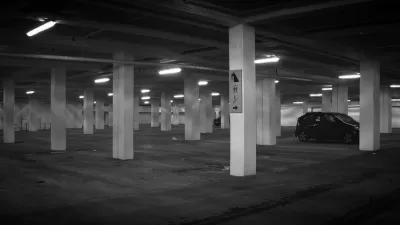In Washington D.C., and cities across the U.S., many planners believe the decline in driving and auto ownership presages a major reshaping of urban land use. As the demand for parking spaces wanes, how will our streets and blocks change?
"The clamor for more spaces continues from some quarters of [D.C.], beating back [Planning Director Harriet] Tregoning’s drive this year to unhitch developers from mandates to create more parking when they put up new buildings," notes Ashley Halsey III. "But by the end of the 21st century, parking garages may go the way of the horse stables that were an omnipresent part of the city 100 years ago."
“Shared cars might be driven 95 percent of the time and parked 5 percent of the time. That’s clearly where we’re headed,” Tregoning said. “If the 95-5 happens, whole streets that now have parking on them won’t need it. We’ll have wider sidewalks. We’ll have more bike parking. It will be really lovely.”
FULL STORY: The search for a parking spot

Planetizen Federal Action Tracker
A weekly monitor of how Trump’s orders and actions are impacting planners and planning in America.

Chicago’s Ghost Rails
Just beneath the surface of the modern city lie the remnants of its expansive early 20th-century streetcar system.

San Antonio and Austin are Fusing Into one Massive Megaregion
The region spanning the two central Texas cities is growing fast, posing challenges for local infrastructure and water supplies.

Since Zion's Shuttles Went Electric “The Smog is Gone”
Visitors to Zion National Park can enjoy the canyon via the nation’s first fully electric park shuttle system.

Trump Distributing DOT Safety Funds at 1/10 Rate of Biden
Funds for Safe Streets and other transportation safety and equity programs are being held up by administrative reviews and conflicts with the Trump administration’s priorities.

German Cities Subsidize Taxis for Women Amid Wave of Violence
Free or low-cost taxi rides can help women navigate cities more safely, but critics say the programs don't address the root causes of violence against women.
Urban Design for Planners 1: Software Tools
This six-course series explores essential urban design concepts using open source software and equips planners with the tools they need to participate fully in the urban design process.
Planning for Universal Design
Learn the tools for implementing Universal Design in planning regulations.
planning NEXT
Appalachian Highlands Housing Partners
Mpact (founded as Rail~Volution)
City of Camden Redevelopment Agency
City of Astoria
City of Portland
City of Laramie





























